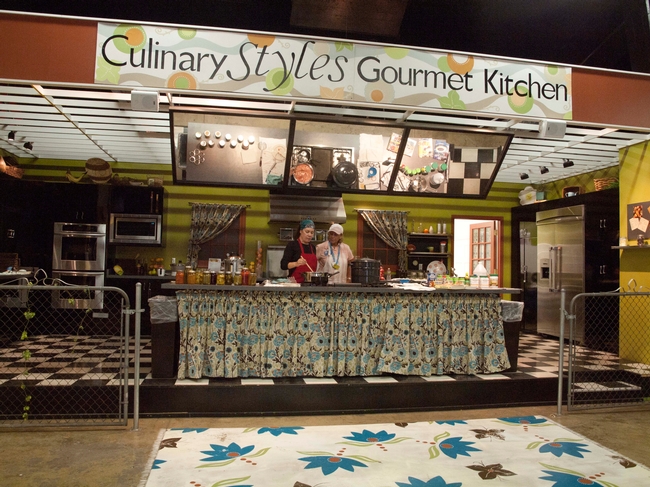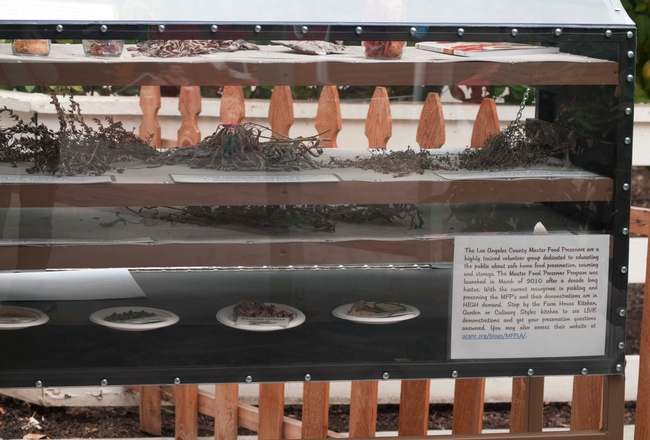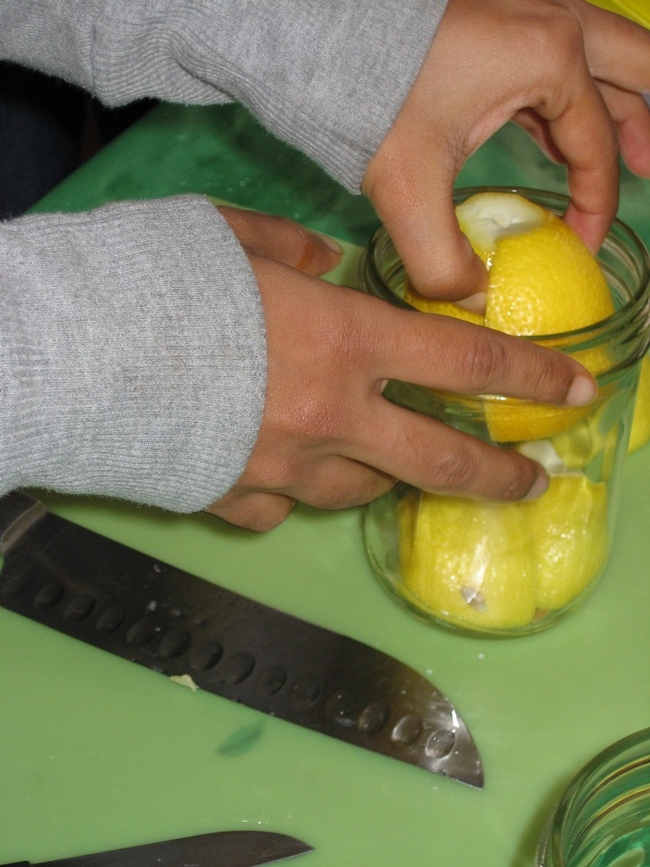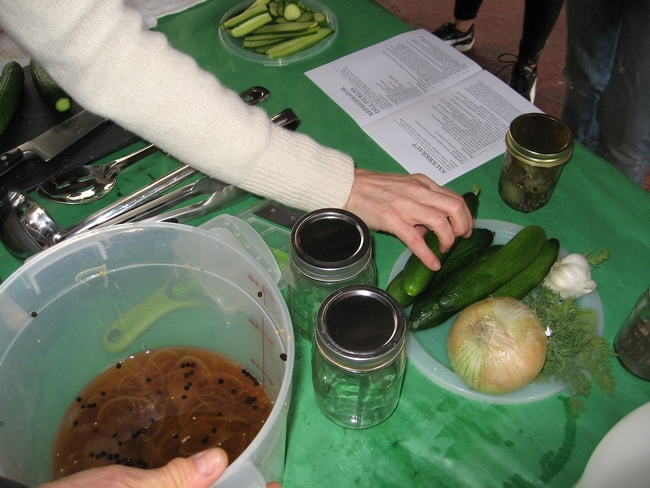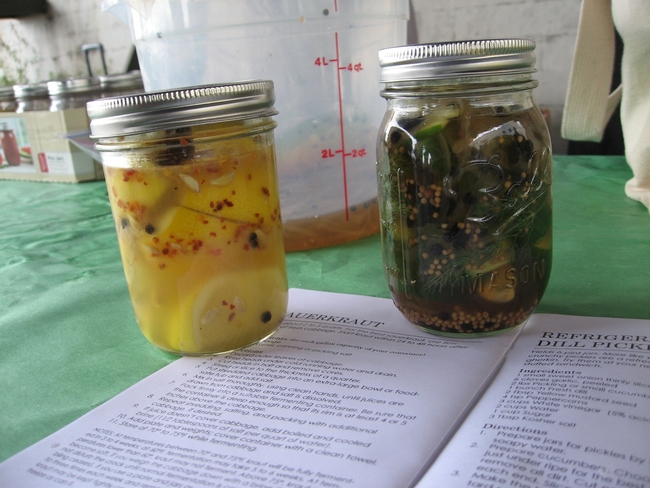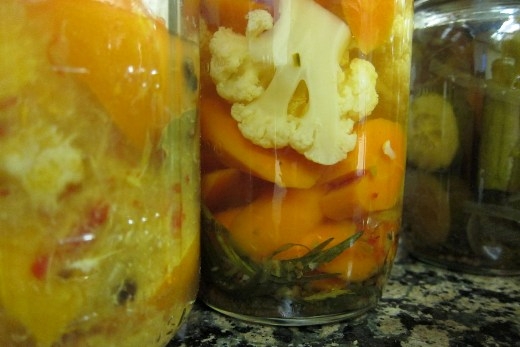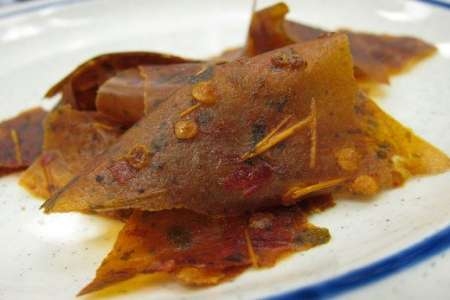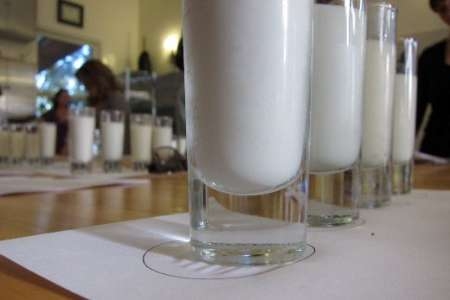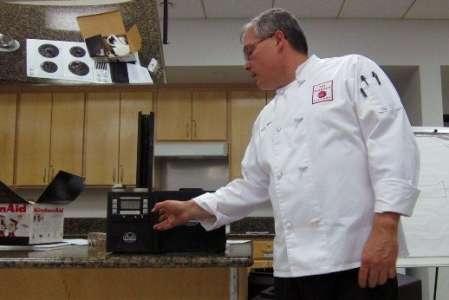- Author: Susan Lutz

Francine had 73 entries in this year's Preserved Foods competition and won the most first place ribbons this year, which earned her the prestigious 2012 Blue Ribbon Sweepstakes Award. To honor her achievement, The Master Food Preservers of Los Angeles County presented Francine with a Thermapen thermometer, generously donated by Thermoworks.

Francine has won the Blue Ribbon Sweepstakes Award nine times since her first win in 2001 and has become a living legend within preserved food competition circles. During the short time I spent with Francine at the LA County Fair, a number of people stopped in their tracks when they realized that they had stumbled upon the elusive Francine Rippy. One woman said she'd always wanted to meet Francine because she'd been losing to her for years. Another woman interrupted our interview to offer Francine the fruit from her neighbor's fig tree. Francine accepted these compliments with grace and left with a new source for fresh figs.
Entering the Preserved Foods Competition at the LA County Fair is only a small part of Francine's food preservation efforts. She preserves food year round, much of it coming from her four-acre property in Hacienda Heights. When asked about her favorite preserved food, Francine said that she likes the boysenberry leather best. Why? Because it's good. And she grows the boysenberries herself, just as her grandmother did.
When Francine was a child, she followed her grandmother around in the boysenberry patch on the family ranch, eating the ripe boysenberries and putting the unripe ones in her basket. When picking berries in her own boysenberry patch, Francine encourages young visitors to do the same. "I tell them that's their job since that's what I did."
Francine's grandparents' ranch has been turned into a museum-- The Hathaway Ranch & Oil Museum-- and Francine is the executive director. In this role, Francine helps to preserve a small piece of California's pioneer past, but she lives very much in the present. She's also always looking forward. I asked Francine if she had any advice for people hoping to enter the preserved foods competition at the LA County Fair next year. She smiled and said, "The judges have a sweet tooth."
- Author: Susan Lutz

Sadly, I missed the event, but fellow MFP Karen Hobart was there and took these photos. (Thanks, Karen!) She reports that Chef Miller gave a great demonstration of classic preservation techniques, which included making strawberry jam, fermented dill pickles, and crushed tomatoes.
If you missed Chef Miller's demonstration and you're still wondering what to do with an overabundance of tomatoes from your garden, check out this new resource page on Home Preserving Tomatoes from the National Center for Home Food Preservation.

- Author: Susan Lutz
If you haven't already planned your visit to the LA County Fair, now's the time. Master Food Preservers from Los Angeles County are on hand giving demonstrations and waiting to answer your questions about food preservation. On Wednesday, September 5th, Susan Nickels and Nancee Siebert got the ball rolling with a great introduction to the world of jam and jelly production (both with and without pectin).
Volunteers from MFPLA will present demonstrations at the Culinary Styles Stage (under the racetrack grandstand) on Wednesdays and and Fridays, 9/5 - 9/28 from 12 to 3 pm. Topics include jams and jellies, the art of pickling and fermenting, and how to preserve tomatoes.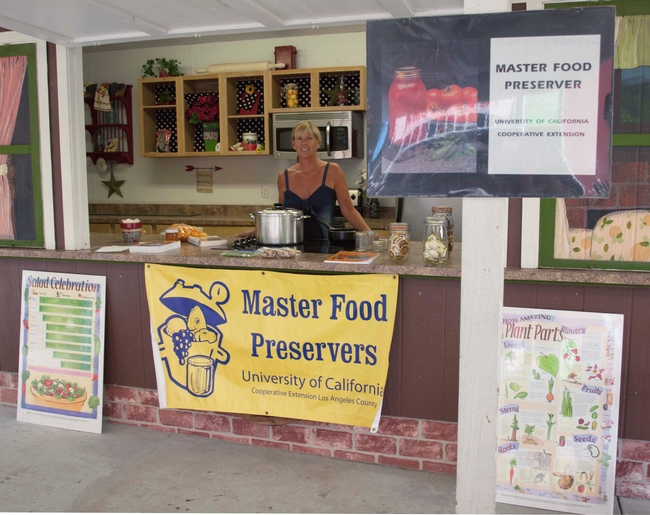
In the Farm House Kitchen across from the Big Red Barn, MFPs including Liisa Primack (seen above) will be discussing dehydration and other methods of food preservation. Come visit us from 9 am to 12 pm, Wednesdays through Fridays, 9/5- 9/28 and see Liisa's fantastic solar dehydrator.
- Author: Sarah A Spitz
From the Los Angeles County Fair website: “Deep-fried. On-a-stick. Battered. Breaded. Dipped in chocolate. Eating at the Fair is a unique experience. With more than 300 choices, undo the top button on your pants and dive in. If you’re a little nervous, we do have yogurt, smoothies, fruit and salads too!”
If your diet leans more toward the seasonal and DIY (do it yourself), this year’s LA County Fair offers you the chance to learn how to preserve what’s in season now, all year long, in your own home kitchen.
Certified volunteer instructors from UC Cooperative Extension Master Food Preservers for Los Angeles County (MFPLA) will be on hand for their second year at the fair, offering demonstrations, recipes and food safety tips.
Whether you’re a gardener swimming in excess summer fruits and vegetables or a savvy shopper who buys produce in bulk, you’ll learn simple techniques for food preservation that you can do at home.
New this year, MFPLA offers demos on two stages: The Culinary Styles Stage (part of The Village on Broadway) and the Farm House Kitchen (at FairView Farms) across from the Big Red Barn.
Also for the first time, the Master Food Preservers of Los Angeles County will honor the winner of the Food Preserving Competition Sweepstakes with a grand prize gift, the Super-Fast Thermapen™ professional model digital instant-read thermometer, donated by ThermoWorks.
At the Culinary Styles Stage (under the racetrack grandstand), MFPs will present on Wednesdays and Fridays, 9/5 – 9/28 from 12 to 3 pm. Learn to make jams and jellies at 12 pm; the art of pickling and fermenting at 1 pm; and how to preserve tomatoes at 2 pm.
Starting September 5th, a potpourri of preservation techniques will be taught by MFPs at the Farm House Kitchen across from the Big Red Barn on Wednesdays through Sundays, between noon and 9 pm.
A special feature will be MFP Liisa Primack’s giant solar dehydrator, on display at FairView Gardens from 9 am to 12 pm, Wednesdays through Fridays, 9/5 – 9/28.
Built from an Internet-based design by Vista Metals Corporation in Fontana, CA, the dehydrator will be on display throughout the Fair with special demonstrations on weekday mornings for the Fair Kids Program.
Among the MFPLA volunteer teachers on the Culinary Styles Stage are Antelope Valley-based former three-time Los Angeles County Fair Food Preserving sweepstakes winner Nancee Siebert; newly-named Hollywood Farmers Market Manager, Alexandra Agajanian; Hollywood Farmer’s Kitchen chef and MFPLA lead instructor Ernest Miller; LA Trade Tech culinary instructor Donald Warriner; from the original class of graduates (June 2011), Laurie Dill, Karen Hobert and Carol Ann Susi and 2012 MFP graduate Noelle Olson.
On the Farmhouse stage, in addition to some of the above-named MFPs, audiences will learn additional preservation techniques from professional cook Hae Jung Cho; Chicks with Knives co-partner Rachael Narins; University High School teacher Nance Rosen; and Fall 2011 MFPLA graduates Amy Goldman and Anita Ferry.
The mission of the Los Angeles County Master Food Preservers is to train volunteers to teach in low-resource communities, demonstrating how to safely preserve foods at home. Among the volunteer teachers are chefs, caterers, nonprofit leaders, homesteaders, bakers and breadmakers, farmers market employees, journalists, lawyers and a whole host of others concerned with re-skilling the community.
Some of the skills MFPs learn and teach are dehydration, fermentation, freezing, water bath canning, pressure canning, charcuterie, cheese and yogurt making, pickling, making jams, jellies and marmalades, and preparing emergency food. All graduates are certified as UC Master Food Preservers, utilizing USDA standards.
LA County Master Food Preservers answer questions from the general public and offer classes or demonstrations at various locations. In addition to their presence at the LA County Fair, volunteers are seen throughout Los Angeles at food festivals, civic events, community gardens and anywhere that they are called upon by the community to teach and demonstrate food safety.
To contact the Los Angeles County Master Food Preserver program and request volunteers, email mfpla@ucdavis.edu. To find more information and a calendar of events, please visit our Facebook page at www.facebook.com/mfpla, our blog at http://ucanr.org/blogs/MFPLA or the program’s website at http://celosangeles.ucdavis.edu.
- Author: Sarah A Spitz
On June 5, author Susan Lutz will earn her certification as a UC Cooperative Extension Master Food Preserver for Los Angeles County. She wrote this for Zester Daily, where she is a contributor. We share this lovely essay with you with the express permission of Zester Daily.
Home Canning Rebirth
Master Food Preservers get back to basics with an agenda to spread the word of home canning.
By Susan Lutz | Thursday, 31 May 2012 | 00:31
I didn't eat a canned vegetable until I was 12. I was at summer camp, and the minute the canned green bean touched my tongue I spit it out, convinced it was rotten.
I thought I'd eaten canned green beans before -- the green beans my mother grew in her large kitchen garden that she and my grandmother would "can" in mason jars and keep in neat rows in the basement pantry. To me, those were "canned green beans," and I loved eating them in the winter even though I thought my mother was crazy and old-fashioned for spending so much time and energy preserving the food she grew in our large garden plot.
The difference between my mother's sweet, delicious "canned" beans and the gray, salty blobs I first tasted at summer camp reveals the stark difference between traditional food preservation and the industrial food system. This stark difference is one reason behind the surge of interest in home canning and preserving.
But there's another avenue to discovering the joys of successful canning, and it doesn't require a visit to your grandmother's notebooks or a search through mysterious old cookbooks.
A 12-week course through the University of California
The Master Food Preserver program is an intense, 12-week program offered by the University of California Cooperative Extension Los Angeles. It is designed to not only teach the basics of safe and successful food preservation but to spread the word to local communities.
I first heard about the MFP program when I took a class on holiday food-crafting from Joseph Shuldiner, director of the Institute of Domestic Technology. He mentioned his status as a Master Food Preserver, and I had to find out more about the program.
I was instantly fascinated. The MFP Program covers not only canning but pressure-canning, freezing, dedhydrating, cheese-making, pickling, fermenting, the exciting list went on and on. I'd learned some of my mother's basic canning recipes back home in Virginia, and I even helped my father make his home-cured hams (which hang in his basement for a year before they're eaten.) But The MFP program was clearly more than old recipes rediscovered. The classes promised safe, USDA-approved methods for dozens of types of food preservation.
And once the session ends, graduates are expected provide 30 hours of volunteer work and 15 hours of continuing food education every year. The goal is to teach simple and easy food-preservation techniques to residents in low-resource communities that would help them eat healthier foods and save money. In a place like Los Angeles where fruit literally falls from trees that line the city streets, food preservation can be a budget-stretcher and a life-saver.
It's a rigorous program. But there was the promise of fresh fruit preserves, home-made goat cheese, and perfectly canned green beans. I wanted in.
Focused on sharing the wealth
It turns out that I wasn't alone. Selection for the class is highly competitive. The program is offered around the country, and its Los Angeles branch began in 2010. Two classes of 18 students apiece have graduated so far. When I learned the program was accepting applications for the third class, I sent in my application and prayed silently to the gods of cheese-makers and the spirit of my Grandma Willie (whose Shenandoah apple sauce still haunts my dreams).
I was surprised and delighted to find that I was accepted into the program. And thus begun my immersion into the boiling water bath of preservation information.
I quickly learned that the program is more focused on teaching trainees how to share information with others than it is about teaching endless food preservation techniques (although I must say that my knowledge and interest in food preservation has grown exponentially since I started the class). All MFP trainees are expected to have a solid knowledge base when they enter the program and to keep learning new techniques after the course ends.
The most surprising discovery of the program was that the reference materials we use in class are available to anyone who's interested. Some of my favorites include The National Center for Home Food Preservation and the L.A. County Master Food Preservers blog. I've also become a huge fan of the book "So Easy to Preserve," which I've used many times in the past 10 weeks. (The section on fruit butter recipes helped me invent my family's current favorite toast-topper loquat butter.)
Our lead instructor, chef Ernest Miller, runs each class with military discipline (he's a former Marine), culinary expertise (he's the chef at the Farmer's Kitchen, a nonprofit community-oriented kitchen) and deep wells of knowledge (he's a graduate of Yale Law School). I thought I knew everything I needed to know about jam-making, but when he and two former graduates of the class began their lecture, I realized there was a lot more to learn.
Miller started the class by saying: "This isn't Smucker's." Over the next four hours I learned the difference between jam, jelly, preserves, conserves, marmalade, fruit spread and fruit butter. And that was only the beginning.
Salsa leather, from the Master Food Preserver program.
The "blind milk test taste" comparing goat's milk, organic single-producer milk, and "grocery store" milk sourced from multiple producers.
Chef Ernest Miller demonstrates the use of a smoker.
I'm currently 10 weeks into the program, and "graduation" looms. If I pass my final exam, I will be rewarded with the title of Master Food Preserver" and you'll see me and my classmates talking about food preservation techniques at local farmers markets and at the Los Angeles County Fair. But my immersion in preservation techniques has only highlighted how inaccurate the term "master" is in my case. In the course, I've only uncovered the rudiments of these techniques. I'm excited to spread the word, and particularly excited to explore and practice these techniques on new and different foods (Pickled squash! Salsa leather! Dehydrated kimchee chips!)
And, with luck, my youngest daughter might someday taste a commercially canned vegetable and spit it out, saying "What's that?!"
I'll hand her a spoonful of loquat butter to get the bitter taste out of her mouth and say, "Kid ... there's a program you should know about ..."
Zester Daily contributor Susan Lutz is a photographer, artist and television producer. A native of Virginia's Shenandoah Valley, she currently lives in Los Angeles, where she is writing a book about heirloom foods and the American tradition of Sunday dinner. She also blogs about the subject at Eat Sunday Dinner.
Photo: Pickled vegetables. Credits for photo and slide show: Susan Lutz


